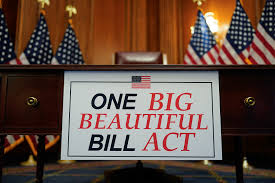The Big Beautiful Bill
7/9/2025


The Senate narrowly approved Donald Trump’s Big Beautiful Bill amid a wave of misleading claims from Democratic opponents. While the bill is far from perfect and faces resistance from fiscal conservatives in the House, it hardly matches critics’ descriptions of it, such as putting the nation on “a new, more perilous fiscal path," enacting “the largest cut to the U.S. safety net in decades,” causing household energy bills to "rise over the next decade," leading to 900,000 job losses, or mainly "benefiting the rich.” These claims are partisan spin masquerading as objective analysis.
The left and the media suddenly focus on spending issues, typically only when Republicans are in power, and argue that the bill will increase deficits by $3.3 trillion over ten years, based on a recent Congressional Budget Office score. However, this estimate depends on the odd premise that simply extending our current 2017 tax system beyond this year would somehow incur trillions in costs. Actually, the bill is projected to save at least $500 billion over the next decade. Nevertheless, this falls short of what House fiscal conservatives prefer, which could jeopardize its passage.
Some critics argue that the bill’s tax measures could lead to increased borrowing and a potential debt crisis. However, aside from short-term benefits, such as reduced taxes on tips and overtime that are offset by spending cuts, the bill largely maintains the existing tax system. The main driver of debt has been Joe Biden’s substantial spending on entitlements and climate policies, which this bill begins to address. A potential debt crisis from an economic slowdown caused by a $4.5 trillion tax increase at year's end, if the bill isn’t passed, could worsen such a crisis. Trump’s legislation aims to promote growth by making essential business provisions permanent and providing greater tax certainty.
The bill mostly extends current tax policies. When it makes changes, many benefits lower- and middle-income families, including a larger standard deduction, expanded child tax credits, lower taxes on tips, overtime, and Social Security benefits, as well as a new deduction for auto loans. Most of these benefits phase out or become unavailable to individuals who itemize their deductions and those with higher incomes. One exception is the increase in the state and local tax deduction to $40,000, though this mostly benefits higher-income residents in blue states. While the bill does help the business community, it isn’t a handout to “the rich” but rather support for the economic engine that employs average Americans.
Spending on Medicaid or food stamps is not being cut; the House and Senate bills simply slow the programs’ (unsustainable) rate of growth. They achieve this by introducing modest work requirements for able-bodied adults, resisting a scheme that states use to inflate federal Medicaid spending, and urging states to be more proactive in identifying fraud. Our recent analysis of the CBO forecast on who would “lose” Medicaid by 2034 shows a population of able-bodied adults not complying with the work requirement, illegal migrants, and individuals eligible for other subsidized coverage.
Opponents are outraged about the bill’s new restrictions on Biden’s green energy subsidies, claiming it will “gut” some of the fastest-growing grid sources, potentially raising prices and reducing renewable jobs (or even hindering AI development). However, these industries aren’t expanding because they are more advanced or cost-efficient; in fact, they are challenging to integrate into the grid, expensive, and unreliable for high-energy demands, such as those required by artificial intelligence. Their growth is driven mainly by substantial government subsidies, which divert capital away from cheaper, more reliable fossil-fuel sources. The demand for natural gas turbines remains high, and with Trump’s deregulation, fossil-fuel plants will quickly step in to fill the gaps, offering similar or better employment opportunities.
A humorous aspect of all this criticism is that if Democrats were in control, they’d pass a bill similar to the megabill: extending nearly all current tax rates, except the top rate for high earners. They would also significantly increase spending on green subsidies and government programs. In contrast, the GOP megabill provides tax stability, funds the military and border security, and introduces modest reforms to curb excessive entitlement spending.
